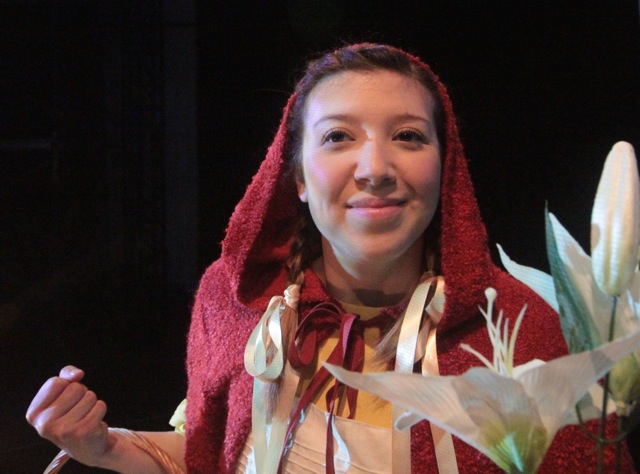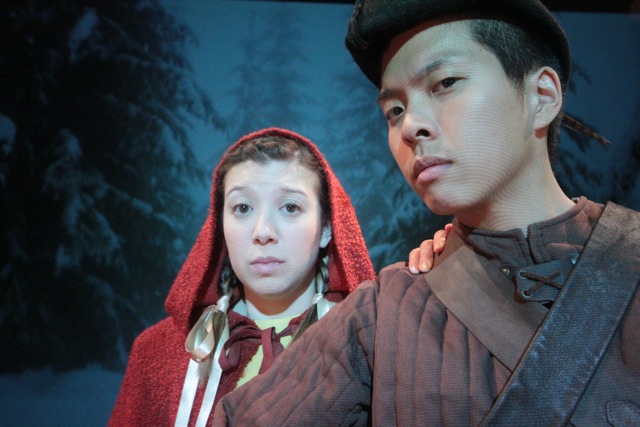Jay Dodge and Sherry Yoon are the creative forces behind Boca del Lupo, a Vancouver-based theatre company that has been challenging the boundaries of traditional theatre for more than twenty years. Their latest production Big Bad is part of the Children’s Festival that runs from May 25th through to May 31st. Big Bad is a contemporary reinvention of The Little Red Riding Hood. Jay Dodge spoke to us about Big Bad, Boca del Lupo and his love for groundbreaking theatre.
Boca del Lupo is an intriguing name! What is the story behind it and how does it represent the spirit of the company?
Yes! “Boca del Lupo” is an Italian phrase. It literally translates to “mouth of the wolf”, but figuratively it is the same as “break a leg” and “good luck” in the theatre. As we wanted to create brand new works, it symbolised the risk and excitement of creation. We were going into the mouth of the wolf!
How did Boca del Lupo come together and what is your vision?
I was one of the founders of Boca del Lupo back in 1996 right out of school. Our mandate has always been to create new work and work that has a multidisciplinary approach. I specifically started out as an actor but my official role in the company now is that of Artistic Producer. For this particular play, as for much of my work at Boca del Lupo, I was head writer. I worked with contributing writers and also did some production design. I led a team of folks for the video and sound design. It’s not like I did it all by myself but I kind of helmed it. Sherry Yoon is Boca del Lupo’s Artistic Director. When it comes to the creative visioning of the company, we are kind of a two-headed monster. She is also the director and co-creator for Big Bad.
What is Big Bad’s take on The Little Red Riding Hood, in the context of the Children’s Festival?
It was almost five or six years ago that the Children’s Festival first approached us. We had previously done somewhat all ages type of work. Our large-scale outdoor works have always had an all ages appeal but we had never specifically done Theatre for Young Audiences (TYA). It took us a few years to figure out how to take our ideas and apply them to TYA in a Children’s Festival context. What grabs our attention sometimes is a story. Sometimes it’s divine concept or sometimes it’s just thematic. I have a couple of kids now and I consequently became interested in exploring the difficulty of identifying dangers in the modern world. When I grew up in the 1970s, my Mom would tell me to go outside and come home when the streetlights came on. If we did that now Child Services would come and take our children away. So we wanted to tackle that idea of modern danger- how monsters don’t look like monsters anymore. They are harder to identify. When adults hear The Little Red Riding Hood story they pretty quickly see it as a metaphor for child predators. The Wolf becomes symbolic. The Little Red Riding Hood is the perfect story to deconstruct for the exploration of danger. We really exploded it and didn’t just do a simple telling of the story. The ultimate goal of the piece is to create a little bit of a vocabulary with which parents can communicate with their children about these issues.
Do you think it has become necessary to update fairy tales?
I don’t think our goal was to make a fairy tale more relevant, but the fairy tale was a useful tool for us to explore the topics we were interested in.
How has children’s theatre been different from your previous body of work? Was it more challenging?
It has been a delight. It has been a bit of a learning curve too. We worked closely with a number of different artists, including Kathleen Carroll who is the Creative or Artistic Director of the Children’s Festival. She encouraged us to treat children’s theatre as theatre for any other audience. She really encouraged us not to underestimate the sophistication of children. We went to a number of schools as we were creating this show and spoke to kids, in Grades 1 to 4, to get an idea of their baseline understanding of “danger”. It turned out that children that age are really articulate. They have a profound and nuanced understanding of the world. We tried our best to resist the temptation of treating TYA differently from regular theatre. Obviously there is certain vocabulary you want to avoid to make sure you are not talking too much over their heads. Other than that we found that it is not nearly as different as we thought it might be.
Do you have a big cast for this show?
Relative to cast sizes today, it is mid-size. The cast is five people. Within the context of the Children’s Festival it is a decent sized cast.
Do you have future projects lined up in children’s theatre?
I think we are going to see how this one goes. We have always usually done all ages, outdoor pieces. We have done shows in the high up canopy of Stanley Park, underneath the Burrard Street Bridge and in the streets of Gastown. Those have all had an intergenerational appeal. I am sure we will continue to do that. Because we have kids now, there is definitely an interest in children’s theatre on a more personal level. On a professional level, we are learning about the artistic and business sides of children’s theatre. It is uncharted territory for us. We have had enormous fun and got a lot of energy doing this one. It would be great to do more. Will we become a TYA theatre company exclusively? Probably not. But catering to children’s theatre from time to time, absolutely!
Boca del Lupo’s shows are very different from each other. How do you select your acts?
We are easily bored! We try to keep it interesting for ourselves. The shows all look different, as you say, but for us it is all one trajectory of artistic inquiry that has evolved over time. We have created around 40 or so works, over the 20 years. Even though the productions look different, our approach is similar. We have even written down a process for deciding what makes a Boca project. A lot of it depends on innovation and the interdisciplinary aspects of a project. Boca projects must have relevance to the current times and a certain level of inventiveness. In our last piece, which will roll out soon, Red Phone, we built two phone booths and commissioned playwrights to write 5-minute conversations that the audience will have with each other over the phones using a teleprompter. It may seem really different from our other shows, but the novel approach to audience engagement and storytelling is the same.
What are your plans for Boca del Lupo for the next couple of years?
We will embark on our next big project in July with a company from Ireland called Performance Corporation. We will be going to Ireland to do the first bout of development and then we’ll do a developmental showing at the Dublin Theatre Festival, which is a prestigious theatre festival. The show is currently titled Expedition. It is based on the idea of “historic pre-enactment” which builds on historical re-enactment. The show recreates our present day from a hundred years into the future to explore how we might look back on ourselves. We might go to the Magnetic North in the Yukon with it, a year from now. We would like to bring it all back to Vancouver in 2017, as part of the 150th anniversary of Canada, because of its retrospective nature. It looks to the future while being critical in an artistic and fun way about our present.
What is the most fun thing about running a production company?
It is never boring! You get to interact with interesting and creative people on a regular basis. There is administration and fundraising involved of course, and sometimes it can be a bit of a grind, but all that is outweighed by the incredible people. You get to spend your life contemplating ideas and put them into physical works. To be able to do that is a privilege. What has been a hallmark for Boca del Lupo, and something that Sherry and I get a lot of energy from, is working with other artists and bringing them into our laboratory. And not just theatre artists. For this show we are working with a paper artist, a filmmaker and a new music composer. When you mash up different disciplines it keeps you off balance, in a good way. You can’t settle into conventions and habits, because you’re always having to explain and question them, when you work with people outside of your own discipline. We get a lot of energy from that.
Big Bad runs from May 26th to the 31st at the Granville Island Revue Stage. Buy your tickets here: http://ticketstonight.ticketforce.com/eventperformances.asp?evt=2862
-Prachi Kamble


